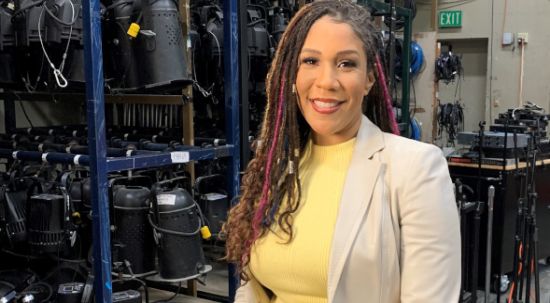Award-Winning SDSU Researcher Sheds Light on HIV and Aging in Films
Megan Ebor's work reveals realities of HIV surge and prevention strategies for older adults, African Americans, and women.
By Peggy Pico

Megan Ebor's films aim to bring hope and change in marginalized communities impacted by HIV surge. (Peggy Pico / SDSU)
June 27, 2023 —San Diego State University researcher Megan Ebor’s award-winning documentary Even Me and her feature film TRY brings to life her research to address prevention, treatments, and the realities of living with HIV and AIDS in disproportionately affected communities, including older adults.
Older adults are among the largest groups in newly acquired HIV infections in the U.S. According to the U.S. Centers for Disease Control and Prevention (CDC), those aged 55 and older account for 26% of the 1.2 million Americans living with HIV. Women account for about 18%, and African Americans disproportionately account for about 42% of new HIV diagnoses.
“I research HIV among African Americans, particularly older adults and women. And through narrative storytelling, folks can see themselves and then make changes in their own lives because they identify with the people on the screen,” said Ebor, assistant professor in SDSU’s School of Social Work.
Regardless of age, gender, or ethnicity, the highest risk factors for getting HIV are the same: unprotected sex and sharing needles. But, multiple studies report that older adults are at an increased risk of getting and spreading sexually transmitted infections (STIs), including HIV.
“We’ve always been at risk,” said Carrie Broadus, a consultant with the Minority Aids Project who works with Ebor and other researchers to improve sexual health and HIV prevention in older adults. Some of the reasons for the surge in STIs among older adults include healthier aging, sexual activity later in life (up to about age 85), multiple partners and unprotected sex, Broadus said.
The National Institutes of Health reports that people who are sexually active may be at risk for diseases including syphilis, gonorrhea, chlamydial infection, genital herpes, hepatitis B and genital warts, and cites that the the number of older people with HIV/AIDS is also growing.
Mission in Research and Life
Ebor’s research, films, and documentaries address testing, treatment, and the often-overlooked path of living a healthy, sexual, and productive life with HIV.
“My mission in life is to take the knowledge I acquire and share it with my community in a way that is meaningful to them. So, I use film to translate lab research into direct community impact,” said Ebor.
African Americans, women, and older adults also face inequitable access to testing and treatment, noted Ebor, whose family member experienced all three in a devastating misdiagnosis.
“My auntie, a pillar in our family and her community, was an older adult when we first noticed her cognitive decline and increased irritability,” she explained. Doctors had repeatedly dismissed her aunt’s dementia as a normal part of aging, but a simple blood test would have proved otherwise.
“We later learned my aunt had an undiagnosed sexually transmitted infection that had spread to her brain. She had neurosyphilis. For syphilis to progress to the brain, she would’ve had it for decades and no one ever thought to test her for STIs,” said Ebor.
Easing the Burden
To help ease a patient’s burden of asking for diagnostic tests, the CDC now recommends routine testing for HIV and STIs, meaning medical providers should offer and include the tests for adults of all ages.
“People are often afraid to get tested. They're afraid that they're going to be discriminated against because they're seeking services related to HIV and STIs,” said Winston Tilghman M.D., the director of the HIV, STI, and Hepatitis division at San Diego County’s Health and Human Services Agency.
“They’re afraid of being judged and may not feel comfortable bringing up these issues, particularly with medical providers they’ve had a long relationship with or if family members are present.”
Syphilis is treatable with antibiotics if it’s caught early. But in the latent stage, there are no visible signs or symptoms. Left untreated for 10-30 years, syphilis can damage the brain and other vital organs resulting in death.
“It's important for physicians not to make any assumptions and to discuss sexual health with patients,” said Tilghman. Medicare and most health insurance cover testing and treatment costs, and there are low to no-cost clinics for the uninsured. “Treatment options are much safer, better tolerated, and highly effective.”
Just as it is crucial to educate on available treatment options, so too is it to provide more public insights into HIV research and insights into health, losses, and triumphs. That is exactly what Ebor has done with her newest film, Even Me 2.0 Unfinished Business. The film, which is scheduled for release in the Fall of 2023, reconnects viewers with people living with HIV from her original 2013 documentary.
“I want older adults and communities of color to know that it’s ok to be sexually active– you’re an adult, Ebor said. “We can realize our most optimal health– not just the absence of disease if we take care of our mind, bodies, and spirit, and that includes our sexual health.”
Contact:
La Monica Everett-haynes
everetthaynes@sdsu.edu
Source: https://newscenter.sdsu.edu/sdsu_newscenter/news_story.aspx?sid=79238
"Reproduced with permission - SDSU - San Diego State University"
SDSU - San Diego State University
For more HIV and AIDS News visit...
Positively Positive - Living with HIV/AIDS:
HIV/AIDS News
|